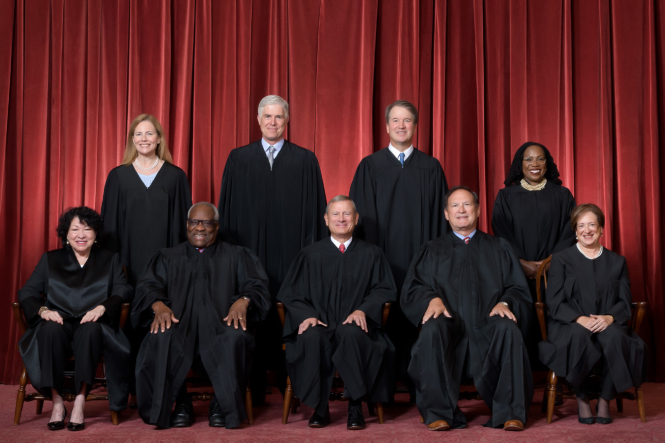The U.S. Supreme Court heard pivotal arguments this week in a case that could reshape how executive orders are challenged in federal court—and potentially redefine the power of individual federal judges across the country.
At the heart of the debate: whether nationwide injunctions—court orders that block a law or policy across the entire U.S.—should be allowed to continue.
In a breakdown shared to Instagram, Daria Rose, a Yale Law School graduate and legal commentator, offered a detailed explainer about what’s at stake, calling it “probably one of the most important arguments for the next decade.”
What’s the Case About?

While the case is linked to a controversial executive order from former President Donald J. Trump aiming to restrict birthright citizenship, the Supreme Court justices focused less on that policy and more on the broader legal tool of nationwide injunctions—federal court orders that can block a law or executive action nationwide, even if issued by a single district court judge.
What Are Nationwide Injunctions?
“Nationwide injunctions,” Rose explained, “are basically court orders issued by a federal district judge that block a policy, a law, or in this case, an executive order—and that ruling applies across the entire United States, not just within that judge’s district or even circuit.”
These powerful tools have been increasingly used over the past two decades. According to legal observers, President Trump saw more nationwide injunctions issued against his policies than any previous president, making the issue politically charged across both liberal and conservative camps.
“Even President Obama wasn’t a fan,” Rose noted.
The Forum Shopping Concern
One of the main criticisms of nationwide injunctions, highlighted during oral arguments and in Rose’s breakdown, is the issue of forum shopping—where plaintiffs deliberately file lawsuits in districts likely to rule in their favor.
“For example, if you have a civil rights case, you’re probably going to want to file that in San Francisco, which is considered liberal,” Rose explained, “as opposed to Beaumont, Texas, where you’re more likely to get a conservative judge.”
That ability to “shop” for favorable rulings has been used by both political sides and has drawn skepticism from the Court.
Justices Divided on the Future of Injunctions

Justices appeared divided during the nearly two-hour hearing.
- Justice Brett Kavanaugh floated the idea of using class action lawsuits as a more appropriate alternative to sweeping injunctions.
- Justice Samuel Alito and Justice Clarence Thomas seemed to favor removing the tool altogether.
- Justices Elena Kagan and Sonia Sotomayor cautioned that eliminating nationwide injunctions could lead to a patchwork legal reality: one in which a policy like birthright citizenship could be legal in New York but banned in Florida.
“If nationwide injunctions are removed,” Rose emphasized, “that would mean each person or parent would have to file individually in court—which is not only expensive and time-consuming, but could also leave fundamental rights unprotected in some states.”
A Win for Presidential Power?
Legal experts warn that scaling back nationwide injunctions would mark a major win for executive authority, especially in light of recent challenges to presidential actions.
“The justice system is one of the last branches holding the line against unconstitutional acts,” Rose warned, “so if judge’s powers are limited, that would be a huge shift.”
The Court is expected to rule by the end of the term. Legal scholars anticipate the justices may not eliminate the tool altogether but could impose new limitations or guidelines for when nationwide injunctions are appropriate.

